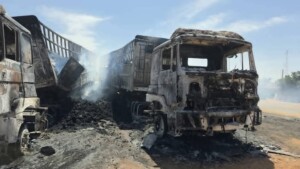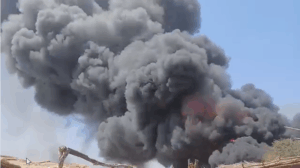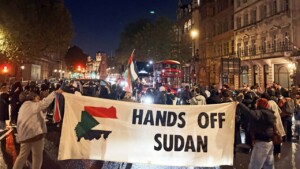‘Sudan govt. wanted Darfur land only’: janjaweed leader
According to a former Darfur janjaweed leader, who was arrested in Sweden in early April, the Sudanese authorities wanted to rid Darfur of the indigenous population.
According to a former Darfur janjaweed leader, who was arrested in Sweden in early April, the Sudanese authorities wanted to rid Darfur of the indigenous population.
The arrestee allegedly served as a militia leader in North Darfur for the Sudanese government during the first years of the war that started in 2003. After that, he fled to Sweden, where he applied for political asylum. Charged with crimes against humanity committed in Darfur, he was taken into custody by the Swedish War Crimes unit in the first week of April, the electronic Sudanile reported on Thursday.
His lawyer told the Swedish daily Dagens Nyheter that it was important for the accused and his relatives not to reveal his identity. “The investigation is still in its infancy and I did not get all the information. I can only say that my client rejects the charges against him.”
Janjaweed
Though the Swedish authorities refrain from mentioning the name of the Darfuri arrestee, Sudanese sources point to Arbab Idris, who served as a North Darfur militia commander between April 2003 and December 2004, after which he fled to Sweden, where he reportedly stayed under the radar, claiming asylum.
Sudanile reported Idris’ arrest in his home town Östersund on Thursday. The SLM-AW posted the video of an interview conducted by Phil Cox of MORE4 news East Africa with the former militia leader on its Facebook page on Friday.
“He said to us exactly: We need only land, we don’t need the people there.”
In the interview, the former militia commander claims he personally dealt with millions of dollars sent by Khartoum to fund the war, and that he had organised the recruitment of thousands of young Arab men to fight as janjaweed.
He spoke about “a secret agreement” between him and a leading member of the Sudanese government in 2003, when the war broke out. The militia leader would recruit combatants among the Arab tribesmen in the region while the government would provide camels, horses, military uniforms, arms, and funds to carry out attacks on Darfur villages and strongholds of the armed movements.
He said that the government official had explicitly informed him that they wanted the land to be freed of the indigenous population. “He said to us exactly: We need only land, we don’t need the people there.”
Asked about the reason, he replied that “It is a racist and a tribal issue. We were attacking villages where there were only blacks, niggers. These people were civilians. They had no weapons.
The militiamen operated mainly in North Darfur’s Kutum. The first village they attacked was Fata Borno. “No rebels in the village. It is more than 25 villages. No rebels. They had nothing to do with the rebels”.
He said that the militiamen attacked the villages randomly. “Firstly, our intention was that when we entered a village, we were to steal and loot whatever we could. As for the water wells, we put sand in and blocked them. We cut down trees and burnt villages. We wanted to force the population out of their areas and give them no chance to live there again.
“These instructions came from Khartoum. Because there is a promise to the janjaweed, beside the money they give them, he must take everything in the village.”
“It is a racist and a tribal issue. We were attacking villages where there were only blacks, niggers. These people were civilians. They had no weapons.
His men also raped women and girls. “I tried to stop them but they refused. They carried on raping. They said they were allowed.”
Idris told the interviewer that he regrets the past. “At that time in my life, I was satisfied and OK with what I was doing. But all that time, I was seeing horrific crimes and killing. I have changed.”
War
Early 2003, two Darfur rebel movements, the Sudan Liberation Movement, founded by Abdelwahid El Nur (SLM-AW), and the Justice and Equality Movement (JEM), headed by the late Khalil Ibrahim, took up arms against Khartoum. They accused the Sudanese government of politically and economically marginalising the country’s western region and oppressing the population, largely of African origin.
The government responded by carrying out fierce attacks against villages, suspected of harbouring rebels. However, the Sudan Armed Forces in cooperation with large groups of militiamen attacked and destroyed hundreds of villages, regardless of the presence of rebel fighters. These militiamen, locally called janjaweed, had been recruited among young, impoverished nomads of Arab origin in the region.
According to United to End Genocide, the Darfur conflict has claimed 300,000 lives, displaced 2.7 million people, and forced another 250,000 to flee abroad, mainly to Chad.
In 2009, the International Criminal Court (ICC) indicted President Omar Al Bashir for war crimes and crimes against humanity. A year later the Court issued a second arrest warrant for Al Bashir on three counts of genocide.











 and then
and then